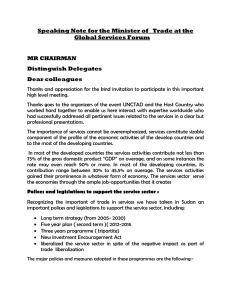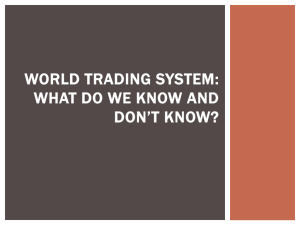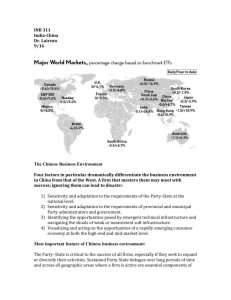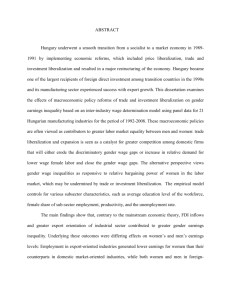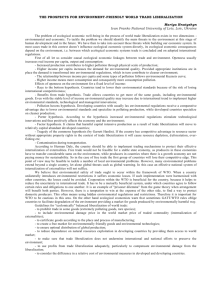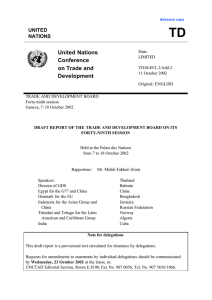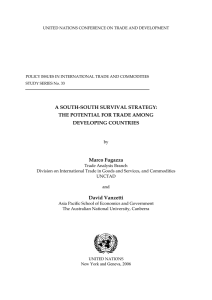Multi-year Expert Meeting on Trade, Services and Development Mr. Chairman,
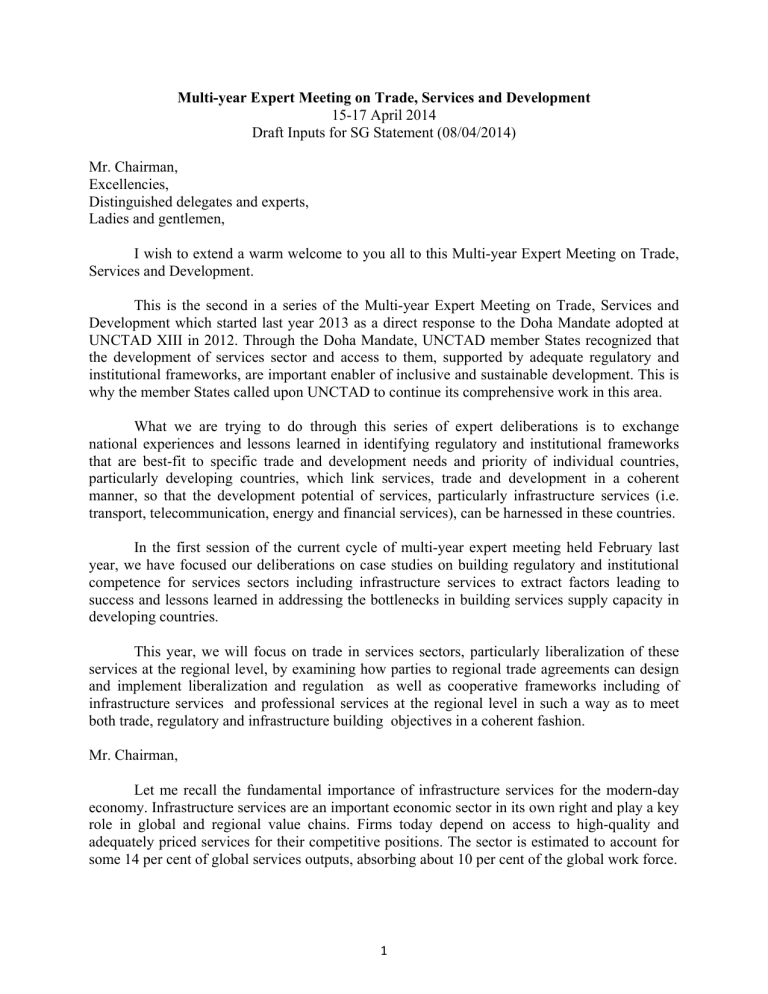
Mr. Chairman,
Excellencies,
Multi-year Expert Meeting on Trade, Services and Development
15-17 April 2014
Draft Inputs for SG Statement (08/04/2014)
Distinguished delegates and experts,
Ladies and gentlemen,
I wish to extend a warm welcome to you all to this Multi-year Expert Meeting on Trade,
Services and Development.
This is the second in a series of the Multi-year Expert Meeting on Trade, Services and
Development which started last year 2013 as a direct response to the Doha Mandate adopted at
UNCTAD XIII in 2012. Through the Doha Mandate, UNCTAD member States recognized that the development of services sector and access to them, supported by adequate regulatory and institutional frameworks, are important enabler of inclusive and sustainable development. This is why the member States called upon UNCTAD to continue its comprehensive work in this area.
What we are trying to do through this series of expert deliberations is to exchange national experiences and lessons learned in identifying regulatory and institutional frameworks that are best-fit to specific trade and development needs and priority of individual countries, particularly developing countries, which link services, trade and development in a coherent manner, so that the development potential of services, particularly infrastructure services (i.e. transport, telecommunication, energy and financial services), can be harnessed in these countries.
In the first session of the current cycle of multi-year expert meeting held February last year, we have focused our deliberations on case studies on building regulatory and institutional competence for services sectors including infrastructure services to extract factors leading to success and lessons learned in addressing the bottlenecks in building services supply capacity in developing countries.
This year, we will focus on trade in services sectors, particularly liberalization of these services at the regional level, by examining how parties to regional trade agreements can design and implement liberalization and regulation as well as cooperative frameworks including of infrastructure services and professional services at the regional level in such a way as to meet both trade, regulatory and infrastructure building objectives in a coherent fashion.
Mr. Chairman,
Let me recall the fundamental importance of infrastructure services for the modern-day economy. Infrastructure services are an important economic sector in its own right and play a key role in global and regional value chains. Firms today depend on access to high-quality and adequately priced services for their competitive positions. The sector is estimated to account for some 14 per cent of global services outputs, absorbing about 10 per cent of the global work force.
1
But the fundamental importance of infrastructure services arises from the fact that they are a key backbone of the economy and inputs to production of all goods and services. The production and international exchanges of both goods and services would not be possible without transport, telecommunications, energy and financial services. Where these services are too costly this puts an excessive burden on countries' trade and development potential. The quality of infrastructure has generally been found to be closely associated with economic competiveness and income levels, pointing to a strong causality between the two.
We should also remember that the infrastructure services sector not only contributes directly to growth, income generation, and higher welfare through increased production and trade, they also play an important role as catalyst of countries' economic and social goals and a tool for the achievement of the Millennium Development Goals (MDGs) and future post-2015 sustainable development objectives.
While the services sector was traditionally seen as non-tradable, trade has become an important facet of all services sectors, although to a varying degree, and developing countries’ participation in this trade has become substantial.
The value of global cross-border exports in infrastructure services (transport, communication and financial services) as a group reached $1.4 trillion in 2012, which is equivalent to 32 per cent of world total services exports. Among the infrastructure services, some sectors clearly play a lead role. This is the case with transport services, which represent 20 per cent of total services exports, and financial services which account for some 9 per cent. For developing countries, cross-border exports in infrastructure services stood at $401 billion or some
30 per cent of their total services exports in 2012.
However, this does not tell a whole story. Cross-border trade captures only one dimension of services trade. In the United States, for instance, affiliate transaction accounted for the majority of US trade in infrastructure services with foreign affiliates supplying the amount ($641 billion) five times larger than cross-border services exports ($132 billion). This means that the bulk of services exports occur through foreign direct investment (FDI)/commercial presence, or
Mode 3 in WTO jargon.
Over the past two decades, developing countries have indeed significantly increased their ability to conduct trade in services through Mode 3. It is symptomatic that the share of developing countries in FDI outflows into infrastructure services increased from virtually zero per cent to 13 per cent between 1990 and 2011 out of the world total FDI outflows into ISS of
$444 billion.
Mr. Chairman,
What these trade figures tell us is that national and international efforts aimed at harnessing the development potential of infrastructure services will inevitably require designing best-fit services-related trade policies, which would ensure adequate coherence with national regulations and institutional frameworks governing a given services sector, and this in turn call upon devising adequate approaches to services trade liberalization and integration, and ensuring adequate sequencing and pacing with domestic regulatory reform and institution building.
2
It is therefore not without reason that policymakers and trade negotiators are increasingly focussing their attention on the services sector. Initial efforts aimed at liberalizing these services centred on progressive liberalization of services pursued at the multilateral level under the GATT
Uruguay Round which culminated in the establishment of GATS, and currently under the WTO
Doha Round negotiations.
But today, the avenues for services liberalization have multiplied, and increased attention is given to regional and plurilateral initiatives. We know that countries increasingly turned to new-generation 21st century RTAs (including the so-called “mega-RTAs”) and the plurilateral
“Trade in Services Agreement (TISA)” in addressing services liberalisation, include infrastructure service sectors. This is partly because of the slow pace of the multilateral services negotiations under the Doha Round, despite the recent positive outcomes at the Bali Ministerial
Conference last year. While only six services RTAs had been notified to WTO before 2000, over
100 additional agreements have been notified since then. Naturally, we will need to carefully assess systemic implications of these initiatives to the multilateral processes, as well as to developing countries. Such initiatives will likely affect trade rules and market access negotiations in the context of the Doha Work Programme.
Another reason is countries’ desire to exploit opportunities created by increased and facilitated services trade through deeper and faster liberalization through regional and plurilateral initiatives. Developing countries have indeed also embarked on regional integration initiatives on services as a major pillar of their development strategy. They do so by building upon and deepening existing South-South regional integration initiatives, often linked up with larger or developed country partners.
The major consequence of regional services liberalization is that it leads to deeper and more comprehensive liberalization than would be achieved under the multilateral process, including by cutting into the applied levels of services trade policy regimes. We have indeed found that RTA commitments on services generally go beyond commitments made under the
GATS, including on infrastructure services and stronger regulatory disciplines, albeit to a different extent across sectors and regional groupings.
This also raises important challenges for the governments to effectively reconcile with national regulatory frameworks as various “regulatory barriers” affecting services trade which are to be eliminated in regional liberalization process may serve for some legitimate public policy purposes. In other words, unlike tariff reduction and elimination relating to trade in goods, liberalization of services inherently requires key judgement as to whether a given regulatory measure are legitimate ones or unduly hinder services trade. As countries increasingly engage in regional services liberalization that goes deeper and broader, policy coherence between liberalization and regulation has become all the more important.
RTAs may be a source of inspiration as the consolidation and expansion of regional integration initiatives are being pursued by many countries as part of their broader development strategy. The notion of “developmental integration” combines market opening with the development of productive capacity and infrastructure building. RTAs have provided viable platform for regulatory harmonization, as well as strengthened regional transport and
3
infrastructure networks and connectivity, including through pooling and sharing of regional resources. Infrastructure services have proven to be an essential component of developmental regionalism.
Mr. Chairman,
This forum provides a unique opportunity for all to exchange views on how countries can harness the development potential of infrastructure services sectors through an integrated strategy with both liberalization and cooperation component at regional and multilateral levels. Over the next three days, you will be deliberating some of the salient questions affecting trade in services, particularly regional approaches to services liberalization, regulations and cooperation, including national and regional experiences in liberalization and regulatory harmonization of infrastructure services in regional context.
I do hope that the deliberations will be useful in helping developing countries to reflect on how making informed policy, regulatory and trade decisions in relation to infrastructure services sectors. I would also encourage you to reflect on how developing countries can be better assisted to harness trade in infrastructure services for development and poverty reduction. It will help us
UNCTAD to identify areas of further research and technical cooperation.
I wish you every success in your deliberations.
Thank you.
4

